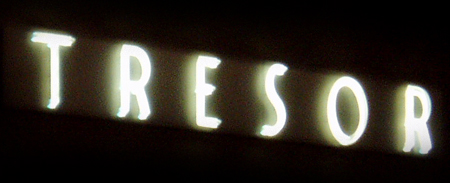Tresor: end of an era
 Toby Frith
Toby Frith  Thursday, June 30, 2005 at 11:51AM
Thursday, June 30, 2005 at 11:51AM 
It’s often said that Berlin is more hedonistic than most cities because of its troubled past. The city’s landscape has changed so much and so often over the last 100 years that its inhabitants realise that a good thing wouldn’t last forever. So it was surprising that its most notorious club, Tresor, stayed open as long as it did. The former department store vault on Leipziger Strasse(Tresor is german for vault) was appropriated by Dmitiri Hegemann back in 1991, and to stay open as long as it did is something of a minor miracle in itself, considering the changes that were happening around it. The surrounding area has changed dramatically in the last ten years, as the steel and glass of government and corporations has imposed itself on the skyline around it.
Tresor grew from a sweaty dark room to a techno label and empire of significant proportions. Helped by the strong connections with Detroit fostered by luminaries such as Jeff Mills, Juan Atkins and Blake Baxter, the club rightly became the most famous in the world, helped no doubt by its grimy decor and being located in what was rapidly becoming the techno capital of the world. The True Spirit CD box set released in 2002 goes to show just how many landmark records were released on this label during its heyday.
But times change, and by the turn of the century it was becoming clear that the label had lost its touch somewhat, with a number of mediocre releases punctuated only occasionally by something that wouldn’t be out of place in its former pantheon. Berlin had changed as well, and so had the music. Tresor’s relentless techno had been superseded by the newer, more organic sounds of the house-inflected Globus bar upstairs as the place to be, but even then it was clear that the locals in particular were seeking pastures new.
The last night of Tresor actually went on for 36 hours until Monday morning, culminating with Hegemann playing the final tracks, aptly. And true to its motif, the place was utterly rammed from start to finish, although this correspondent is relying on 2nd hand reports from Monday at about 4am onwards.
Tresor had been under threat from the owners of the land that the club was situated on, as well as being under relentless pressure from the city council to move. The club was becoming an eyesore for the new bureaucracy taking over Potsdamer Platz, keenly aware that the venue was out of place amongst the refined brick and steel that was shooting up around it. Yet, like a unseemly wart it refused to budge, resolving to stick to it’s infamous slogan, “Tresor Never Sleeps”.
In early 2005 it was announced however that the Wertheim family, who owned the land, were forcing Tresor out, and April 16th was announced as the club’s last night. A series of parties were scheduled, culminating in the last night, with a host of DJs who had helped to make Tresor what it is today.
As I mentioned before, Tresor had made its name because it was a techno club par excellence. The music itself has never been suitable in the sort of post-modernist steel structures that make for clubs nowadays, being more at home in a strobe-filled dark basement where you can smell sweat, damp and see no farther than your own hand, being pummelled by relentess techno. And on our final visit, it showed why music of this nature is so at home here. The last night of Tresor actually went on for 36 hours until Monday morning, culminating with Hegemann playing the final tracks, aptly. And true to its motif, the place was utterly rammed from start to finish, although this correspondent is relying on 2nd hand reports from Monday at about 4am onwards. If there were doubts about its stature within german techno circles still, they were dispelled by a vociferous crowd that partied hard right from the start, with the line-up on the final night consisting almost entirely of residents with the exception of DJ Hell, Richie Hawtin and Ricardo Villalobos (who was rather worse for wear and only managed 30 minutes) However, there were a vast amount of tourists who were paying homage to this unique club, coming from as far away as Toronto in some cases.
Aptly, whilst Tresor has hinted at removing the notorious dungeon and rebuilding it brick by brick in a new location, its closure, however temporary, does in a way signal the end of the looped techno era, a genre that had lost its way by the time hordes of producers were trying to create the new “Steps to Enchantment” (a record that itself is nearly as old as the club). Whilst the harder edged techno continues to proliferate, especially in Eastern Europe, the fact is that Tresor stood as an isolated outpost amongst a number of clubs in Berlin that are warming to the newer, warmer and more experimental sounds that are emanating from Europe right now, and even though Globus had welcomed the housier element of this movement, the techno thundering from the basement was beginning to sound dated.
So, eventually Berlin, in an unusual way, caught up with the club, and like all things related to that utterly unique city, it had to come to an end sooner rather than later. 14 years for a club to run is unusual anywhere, especially here, where fads and fashions can often come and go in the blink of an eyelid. The dungeon may have gone, but somewhere, true spirit remains.
Toby Frith

Reader Comments (1)
have experienced some unique raving sweaty moments there a couple of times!
Unique techno sets, unique venue, unique moments of an unforgettable era...